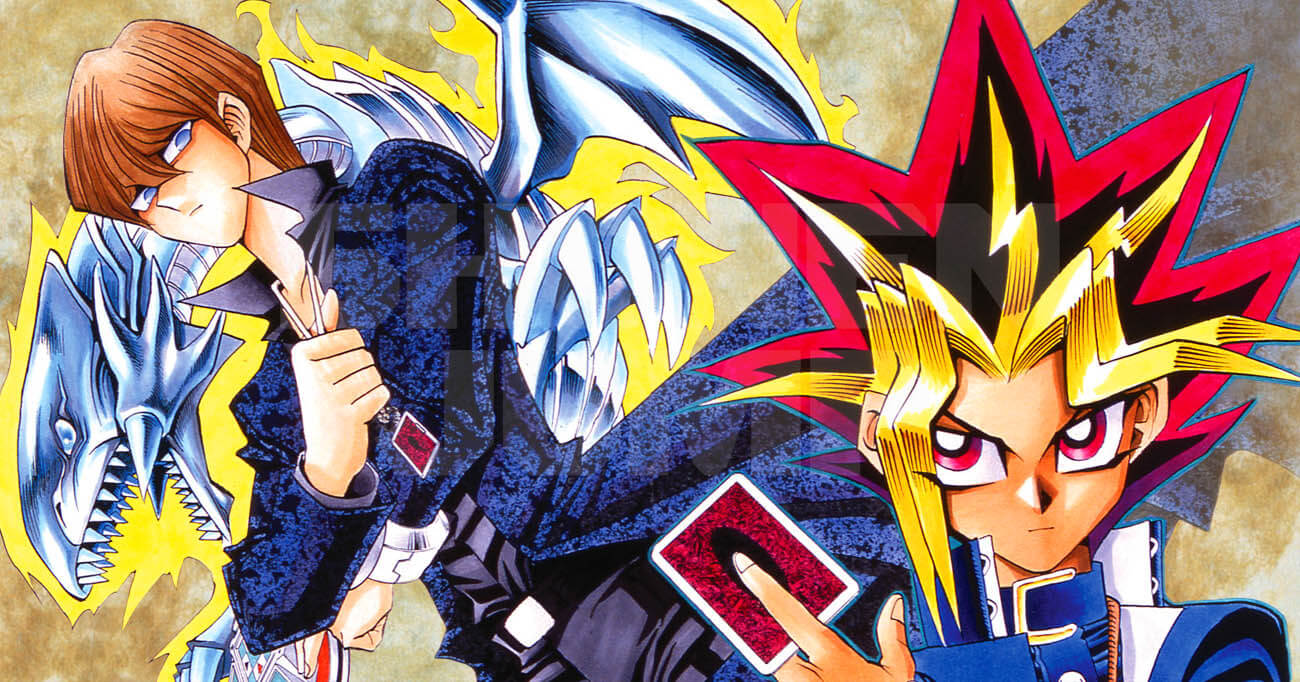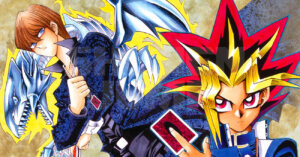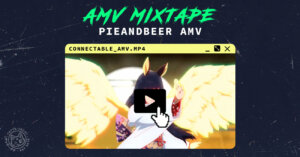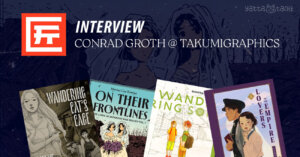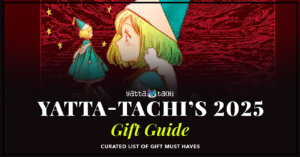Spoiler & trigger warning: This article contains major spoilers for the Yu-Gi-Oh! manga and discussion of family trauma and suicidal ideation.
A Childhood Favorite Seen Through Adult Eyes
As part of an early birthday treat ahead of my 34th birthday in late February, I recently decided to download and read the entire 1996 Yu-Gi-Oh! manga series for the first time. I first read a few chapters twenty years ago in two forms: a 2004 issue of Shonen Jump manga magazine and volume one of the graphic novel. At that time, Yu-Gi-Oh! was in its heyday and the anime English dub was a childhood gateway to the manga and the video game adaptation of the trading card game. Yet as an adult, the Yu-Gi-Oh! manga has taken on a new meaning for me.
Created by the late, great Kazuki Takahashi in 1996, Yu-Gi-Oh! tells the story of a shy, game loving high schooler named Yugi Mutou who solves an ancient Egyptian artifact known as the Millenium Puzzle. Doing so awakens the spirit of a pharaoh that becomes an alter-ego doling out justice to various miscreants via various games, including the card game Duel Monsters. The latter would serve as the basis for the Yu-Gi-Oh! trading card game and become a larger part of the story after it became popular among readers during its initial seven-volume story arc.
In fact, I must admit that I originally only planned to read the first seven volumes of the series. Since I grew up on the English anime dub, I knew the subsequent Yu-Gi-Oh! Duelist and Yu-Gi-Oh! Millenium World arcs had already been animated. While the first seven volumes have also been adapted as a “season 0”, it isn’t available to legally stream. Part of me had always wondered what happened after the first volume I read years ago and the next six volumes satisfied my curiosity with its wicked mix of horror, games, and teenage coming-of age experiences. Yet the character arcs of Yugi Mutou and Seto Kaiba made me want to continue the series. By the end, they alongside Marik Ishtar became my new favorite fictional characters due to the way they overcome their personal trauma to self actualize into their ideal selves.
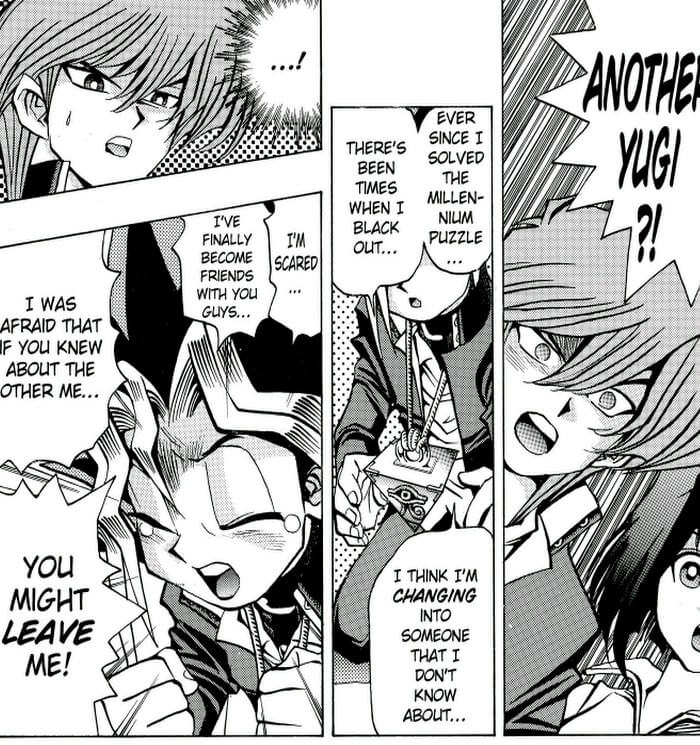
Yugi Mutou: Anxious Yet Courageous
Yugi Mutou stood out to me even more than he did in the Yu-Gi-Oh! Duel Monsters anime. Whereas the anime made it seem like Yugi almost always needed his alter-ego Yami to help fight his battles, the manga demonstrates that Yugi has his own strength but lacks the courage to use it due to being shy and bullied. This is shown as early as Volume 5 of the first Yu-Gi-Oh! manga series, when he confesses to his friends about being aware of his alter-ego despite experiencing blackouts. Fearing that his friends Jonouchi, Honda, and Anzu would reject him, Yugi tries to suppress this awareness but reaches a breaking point during Seto Kaiba’s Death-T game challenges. It is only when Yugi’s friendship is affirmed that he decides not to fear his alter-ego that he occasionally calls “his other self.” This results in Yugi willingly switching places with Yami for the first time to complete a stage of the Death-T challenge, allowing Yugi to remember the events that occur with Yami instead of forgetting them.
As someone who was also bullied in grade school and painfully shy, I could relate to Yugi Mutou deeply. I yearned for friends who could see “my other self” that was behind the shyness and awkwardness, the me that was kind, funny, and creative. It took a while, but with the help of online spaces, I managed to find friends and communities that valued my ideal self. One online community involved the comic book criticism website Comics XF. There, I not only get to be my ideal self, but also show off my strategic side that I honed through playing Yu-Gi-Oh!, and with the mobile card game Marvel Snap, I get to participate in an alliance with my fellow Comics XF writers and share deck strategies like Yugi and his friends do with Duel Monsters.
Seto Kaiba: Strong Drive, Fragile Ego
Alongside Yugi Mutou, Seto Kaiba is another character with surprising depth in the Yu-Gi-Oh! manga. Initially introduced in Vol. 2 of the first Yu-Gi-Oh! manga series as Yugi’s snobby classmate, Seto Kaiba initially rubbed me the wrong way due to his willingness to harm innocent people in order to be seen as the best. This is most notably seen in Vol. 4 of the first Yu-Gi-Oh! manga series, in which Seto Kaiba challenges Yugi Mutou and his friends to a series of deadly games known as “Death T,” as revenge for Yami Yugi defeating him in Duel Monsters in Vol. 2. He even kidnaps Yugi’s grandfather beforehand to blackmail Yugi and gives Yugi’s grandfather a heart attack by challenging him to Duel Monsters with a virtual stimulator that brings the monster cards to life.
As the story progresses , Kaiba becomes slightly more sympathetic when his younger brother Mokuba explains how they were orphans and that Seto was a kind brother who changed for the worse when he was adopted by the abusive, war-mongering billionaire Gozaburo Kaiba. Gozaburo notably taught Kaiba losing means death when Gozaburo kills himself after Seto is named head of Kaiba Corp by the board of directors.
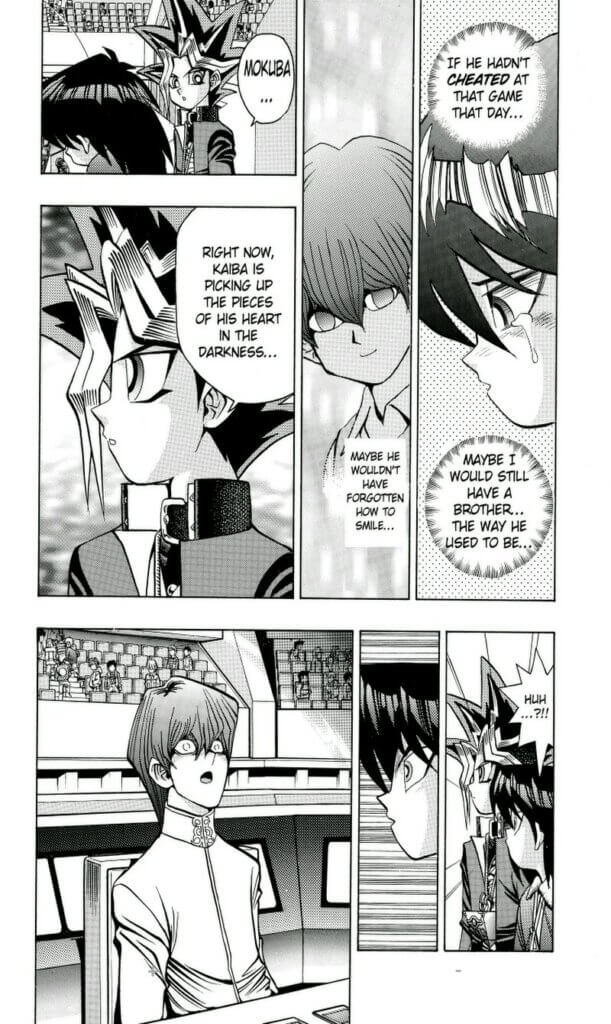
Through trauma, Gozaburo created a monster in Kaiba that is eventually banished by Yami Yugi at the end of Death-T. It is then Yami tells Mokuba, “Kaiba is picking up the pieces of his heart in the darkness, reassembling the shattered puzzle of his heart!” Like Yugi, Kaiba has an “other self” that he lost due to the influence of others, but unlike Yugi, it takes longer for him to put himself back together because of his mistrust of others and his hatred for anyone who reminds him of Gozaburo. Seto is also self-destructive at times due to Gozaburo’s teachings. During the Duelist Kingdom arc of Yu-Gi-Oh! Duelist, Seto threatens to kill himself in order to make Yugi throw the match so Seto meets the condition for dueling Maxmillion Pegasus to save Mokuba.
Although I would never intentionally harm someone else to gain a sense of power, I understand how family trauma can cause either a kind-hearted person to turn cold and cruel, or even just the lack self awareness to know how your actions are negatively affecting others. For many years, my own family trauma weighed me down and caused a stunted self awareness that resulted in me saying condescending things and being inconsiderate of others’ feelings. Like Kaiba, I was taught the wrong things, but unlike Kaiba, I strove to make amends and confront my trauma with the help of therapy and loved ones.
Marik Ishtar: Resentful & Troubled
In fact Seto Kaiba’s arc paralleled not only Yugi Mutou’s, but also Marik Ishtar’s. Introduced in Vol. 11 of Yu-Gi-Oh! Duelist, Marik is at first a mysterious figure working from the shadows using the Millenium Rod to control Rare Hunters, in order to obtain the Egyptian God Cards. It is eventually revealed that Marik blames Yami Yugi for the death of his father and also seeks to obtain Yami’s power as pharaoh.
During the events of the Battle City Finals tournament, a darker personality known as Yami Marik emerges from Marik’s psyche after Marik’s adoptive brother Rashid is put into a coma during a match. Since Rashid was the only person who could keep Marik’s darker side at bay, the shock of seeing him hurt caused Yami Marik to emerge. It is later explained that Yami Marik originally emerged years ago as a result of Marik’s abusive father and that it is Yami Marik who killed Marik’s father. Combined with the weight of Marik’s family legacy as the guardian of the pharoah’s tomb alongside Rashid and his biological sister Ishizu, it is no wonder Marik Ishtar ends up as vindictive at Yami Yugi as Seto Kaiba was.
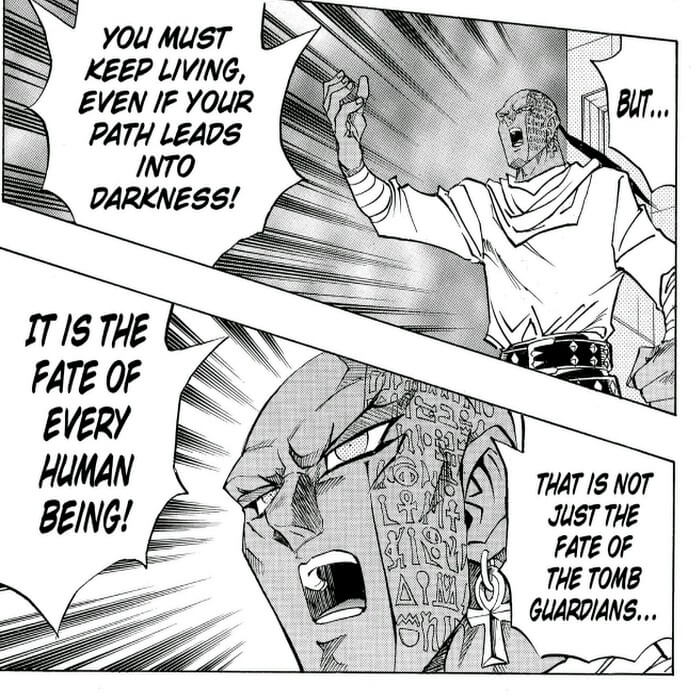
One key difference between Seto Kaiba’s character arc and Marik Ishtar’s is that Marik is nearly driven to despair once he learns the truth behind his father’s death. At this point, Marik is lost in more ways than one, his body is possessed by his darker personality, his spirit barely maintaining its existence due to part of it being in Anzu’s mind. Marik feels remorse for his past actions against his family and Yami Yugi, but feels powerless to do anything against his darker personality. As a result, Marik is willing to sacrifice his own spirit to stop his dark side until Rashid miraculously awakens. Rashid states, “You must keep living, even if your path leads into darkness! That is not just the fate of the tomb guardians, it is the fate of every human being! It is not through death that people go into the light, there is only light in life.”
From Despair To Joy: A Life Worth Living
When I read what Rashid tells Marik to talk him down from despair, my eyes teared up. Having been an unpaid family caregiver for more than a decade since the age of 22, the weight of the responsibility sometimes made me feel as angry and despairing as Marik did. There are many times that the weight feels so overwhelming and painful that I consider ending everything. Yet reading this as I prepared to celebrate my 34th birthday made me want to see what the future has in store for me. Even if more pain were to come, I know that there will be moments of joy and survival that make my life worth living.
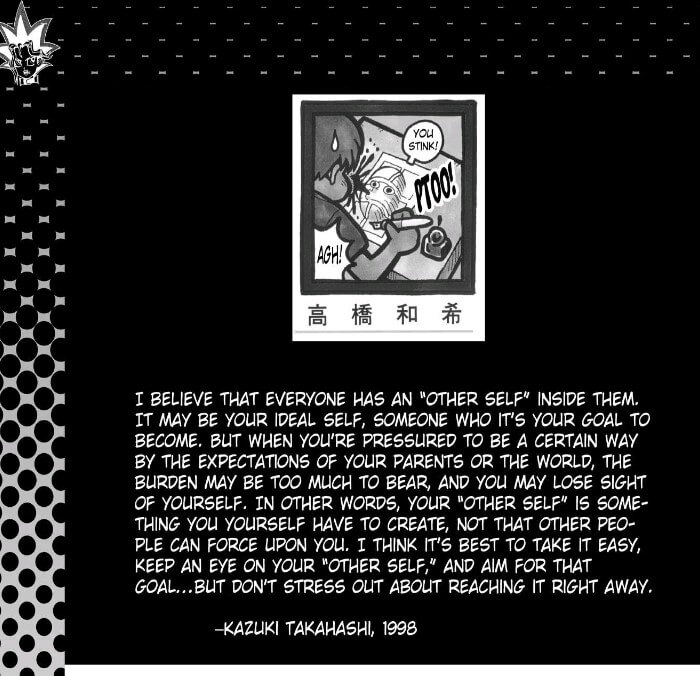
Together, Yugi Mutou, Seto Kaiba, and Marik Ishtar have shown me that my ideal self is worth celebrating and striving for. Even Kazuki Takahashi himself affirms this in an author’s note that reads, “Your “other self” is something that you yourself have to create, not that other people can force upon you.” Even if the puzzle of my heart breaks, I can summon the courage to put it back together.
You can purchase the Yu-Gi-Oh! manga anywhere comic books are sold. You can also read the manga digitally via the VIZ Media app.
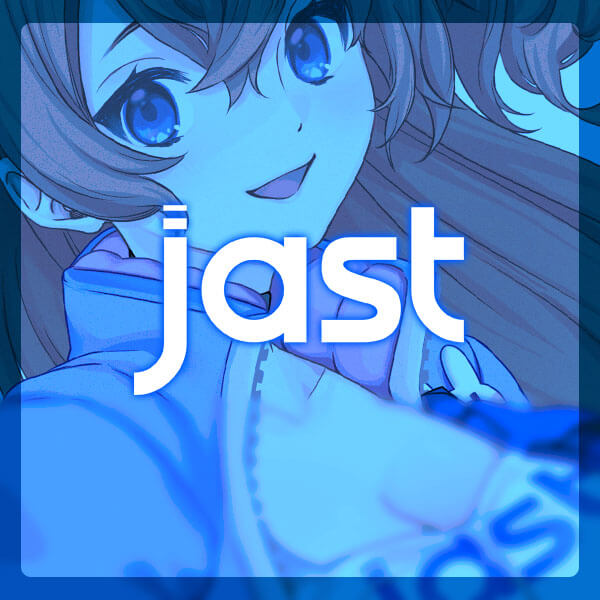
Featured Sponsor - JAST
The sweetest romance and the darkest corruption, the biggest titles and the indie darlings; for visual novels and eroge, there's nowhere better.
Big thank you to our supporters
From their continous support, we are able to pay our team for their time and hard work on the site.
We have a Thank-You page dedicated to those who help us continue the work that we’ve been doing.
See our thank you page